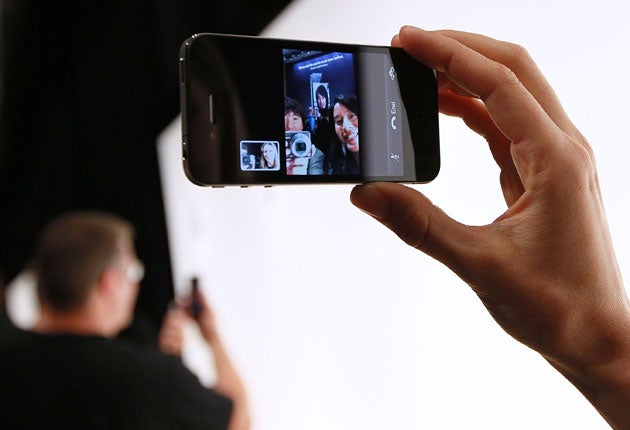Apple's slimmer, smarter iPhone. (It also makes calls, by the way)

Your support helps us to tell the story
From reproductive rights to climate change to Big Tech, The Independent is on the ground when the story is developing. Whether it's investigating the financials of Elon Musk's pro-Trump PAC or producing our latest documentary, 'The A Word', which shines a light on the American women fighting for reproductive rights, we know how important it is to parse out the facts from the messaging.
At such a critical moment in US history, we need reporters on the ground. Your donation allows us to keep sending journalists to speak to both sides of the story.
The Independent is trusted by Americans across the entire political spectrum. And unlike many other quality news outlets, we choose not to lock Americans out of our reporting and analysis with paywalls. We believe quality journalism should be available to everyone, paid for by those who can afford it.
Your support makes all the difference.Apple has launched a new sleeker version of the iPhone as the battle to make the world’s best-selling smartphone intensifies.
A quarter slimmer than the current model, the iPhone 4 will have a camera on the front for video calls, an integrated antenna, an improved display and a gyroscope, which will increase the number of functions that involve tilting or pointing.
Apple’s chief executive, Steve Jobs, announced the new model at Apple's Worldwide Developers Conference in San Francisco, as his company comes under increasing competition from rival handsets, including those based on technology from rival US giant Google.
Ever the showman, he hailed the changes as the "biggest leap" Apple had taken since the launch of the original iPhone three years ago, which has transformed the way people interact with the internet.
"These phones are getting more and more intelligent about the world around them," he said.
"FaceTime video calling sets a new standard for mobile communication, and our new Retina display is the highest resolution display ever in a phone, with text looking like it does on a fine printed page.”
“We have been dreaming about both of these breakthroughs for decades," he added.
The technology website Gizmodo had already published details of a prototype after one was left in a bar by an Apple employee, prompting Mr Jobs to say: "Some of you have already seen this."
Carphone Warehouse predicted there would be “a stampede of customers” while Phones 4 U believed it would encourage more people to buy new ‘smart’ handsets. Its chief executive Tim Whiting said: “We anticipate that the imminent arrival of the iPhone 4 will continue to drive sales and market share, which will be compounded by the arrival of competing smartphones to the market from other manufacturers.”
The changes are the second big launch from Apple in a month. Two weeks ago the company’s launch of the iPad tablet computer was overshadowed by a row over the suicides this year of 10 workers making the gadget at the Foxconn plant in Shenzhen, China.
Mr Jobs subsequently claimed that conditions at the factory were good and yesterday the Taiwanese-owned factory raised wages by 70 per cent, following a 30 per cent increase the previous week.
Although temporarily damaging, the controversy is unlikely to dim the public's appetite for the company's best-selling gadgets. Historically, Apple has led technology, pioneering more user-friendly desktop computers in the 1980s and 1990s. In the past decade it revolutionised music with the iPod and iTunes and the phone market with the iPhone.
Technology pundits warned, though, that the firm would have to work hard to maintain its reputation.
Although the iPhone has around 15 per cent of the smartphone market, it lags behind Blackberry and market-leader Symbian, according to the research firm Gartner.
Phones using Google’s open-access Android operating system, used by many brands including Motorola, Samsung and Dell, is in fourth position but catching up.
Adam Leach, principal analyst at Ovum, said: "The rise of Google Android over two years has been phenomenal and is allowing manufacturers to create appealing alternatives to the iPhone, critically at cheaper prices. The risk to Apple is that these devices offer greater freedom with available content and may prove more appealing if they offer the right user and developers experience..."
While the BlackBerry remains the smartphone of choice for many corporations that need fast email, Apple's prime target remains the public, which has been seduced by its innovation and style. The new-look iPhone is intended to keep the company making the sleekest gadgets.
Responding to yesterday’s launch, CCS insight analyst John Jackson told Reuters news agency: “There was nothing earth-shattering about what we saw or heard. All of that said, you can’t think it will be anything other than a phenomenal success.”
Interpret analyst Michael Gartenberg predicted the iPhone 4 would “force the other competitors to up their game.”
Join our commenting forum
Join thought-provoking conversations, follow other Independent readers and see their replies
Comments